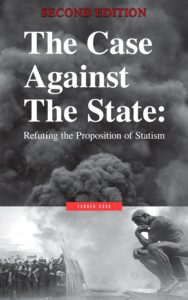Navigating the complex world of bureaucracy can feel like navigating a labyrinth, designed to obfuscate, confuse, and ultimately control. It’s an often paradoxical landscape, where freedom is reduced in the name of power. This is not an accident, but a carefully curated design, created by bureaucrats who wield their influence to erode liberty and extend their grip.
The Bureaucratic Hunger for Power
In the heart of every bureaucratic system lies a palpable desire for power. This craving stems from the very nature of bureaucracy with its rigid rules, controlled processes, and distinct pecking order. It’s the ultimate playing field for those who relish authority and dominance. Bureaucrats are usually drawn to this allure of power, and they don’t shy away from using their positions to assert their authority and influence. However, an unsettling pattern emerges when the bureaucrats’ thirst for control begins to overshadow their commitment to the common good.
As the scales tip, their vested interests start to take precedence, sparking a potentially dangerous cycle where power is amassed at the expense of public welfare. This shift in focus from serving the people to serving oneself often fuels the bureaucratic hunger for power and the subsequent erosion of liberty. It’s this hunger for power that we need to scrutinize and curb to prevent our freedoms from being the sacrificial lamb on the altar of bureaucracy.
The Link Between Bureaucracy and Power
Delving deeper into the association between bureaucracy and power, one can observe an almost symbiotic relationship. Bureaucracy inherently feeds into power by providing a system of rules, procedures, and ranks that can be controlled and manipulated by those in positions of authority. As the bureaucratic system grows in size, the power at the top escalates proportionally, creating an increasingly uneven distribution of control.
A labyrinthine system like this is the ideal environment for power concentration. Decision-making authority is consolidated within a small group of bureaucrats, giving them the means to mold and shape the system to their advantage. These decisions, in turn, are more likely to favor the interests of these decision-makers, further cementing their influence and control.
But the effects of this connection don’t end there.
The ripple effect extends to society as a whole, altering the balance of power and opening the door to potential misuse. The intricate bureaucratic structure provides a veil of obscurity, hiding the consolidation and exercise of power. It’s this obscurity that we must challenge if we are to protect our freedoms from the escalating reach of bureaucratic control.
Bureaucracy’s Ensnarement of Citizens
In the vast web of bureaucracy, everyday people often find themselves inadvertently ensnared. Goofy policies and relentless red tape become an invisible yet ever-present cage, restricting access to essential services and the exercise of basic rights. This bureaucratic maze isn’t merely an obstacle course, it is a finely tuned mechanism of control that subtly amplifies the power base of bureaucrats.
As these webs grow more intricate, so too does the authority of those who spin them. Navigating the resulting bureaucratic maze becomes a complex game, one where the rules are frequently altered to favor those in charge. Each new layer of policy or procedure further embeds citizens within the bureaucratic structure, surreptitiously curbing their freedom while bolstering bureaucratic dominance.
But it’s not just about the stifling regulations. This entanglement also diverts the focus from public service to self-serving interests. The more convoluted the bureaucracy, the more room there is for manipulation and the less room there is for citizen empowerment.
Citizens, then, are not merely navigating a complex system—they’re caught in a strategic trap. With their paths increasingly dictated by bureaucratic guidelines, they are less free agents than pawns in a game of bureaucratic chess. This captures the dual nature of bureaucracy, as it strengthens its hold on citizens, it simultaneously dilutes their freedoms and amplifies its own power. This is the paradoxical power play we must challenge to shield our liberties from encroaching bureaucracy.

> Check Current Book Prices <
Bureaucracy’s Amplification of Power
The bureaucratic machine is much like a magnifying glass, amplifying the power of those perched atop its ranks. This isn’t achieved through brute force, but rather the subtler, more insidious means of policy, paperwork, and protocol. The bureaucratic sphere thrives on this structure of procedures, using it as a veil to mask the undercurrents of power consolidation and decision-making that frequently limit freedom.
In the absence of transparency and accountability, the bureaucracy is akin to an unchecked beast, with bureaucrats at liberty to steer it in line with their personal agendas. The result is a deceptive dichotomy where a supposed system of order and process becomes an enabler of unchecked power, often at the cost of individual freedom.

Bureaucratic Erosion of Civil Liberties
The ripple effects of unchecked bureaucratic power can lead to disquieting repercussions, specifically the erosion of civil liberties. When individuals cloaked in bureaucratic power choose to exert their authority, it can lead to an alteration or even suppression of citizens’ rights. The manifestations of such control may not always be glaring. Sometimes, it takes the form of subtly manipulated laws and protocols, intricately twisted to serve bureaucratic objectives. In more extreme cases, it can manifest through oppressive policies that openly curtail liberties.
However, the end result remains the same, a diminished sphere of freedom for citizens and a concurrent increase in bureaucratic control. This erosion of civil liberties signals a warning bell. It indicates that the scales of power are tipped too heavily towards bureaucracy, threatening the very fabric of our democratic societies. It’s crucial to recognize and respond to these signs promptly, striving to recalibrate the balance of power and secure our civil liberties from the grasping hands of bureaucracy.
The Role of Citizens in Fighting Bureaucracy
In this complex dance between freedom and bureaucracy, everyday people are not mere spectators; they are the critical players. The power to curtail bureaucratic overreach and protect personal liberties lies in the hands of the governed. This can be achieved through meaningful engagement in the community, not at the ballot box, but through sustained involvement in public affairs.
It is crucial that citizens call for openness and hold those in power to account, pressing for transparency in every aspect of governance. This continuous pursuit of accountability helps illuminate the shadows where bureaucratic power might otherwise grow unchecked. Further, citizens must not grow complacent about their rights. Instead, they should become active advocates, demanding that their civil liberties be respected and preserved.
Another essential component in this fight against bureaucracy is fostering an understanding of the system. With knowledge, people can better navigate the bureaucratic ant farm and challenge manipulative procedures. They can also help to create and champion simpler, more effective policies that serve the public good rather than entrenching bureaucratic power.
Ultimately, the people are not just cogs in the bureaucratic machine. They are its architects and its gatekeepers. By actively participating in the fight against unchecked bureaucracy, you can protect their freedoms and work towards a balance of power that serves the community.



